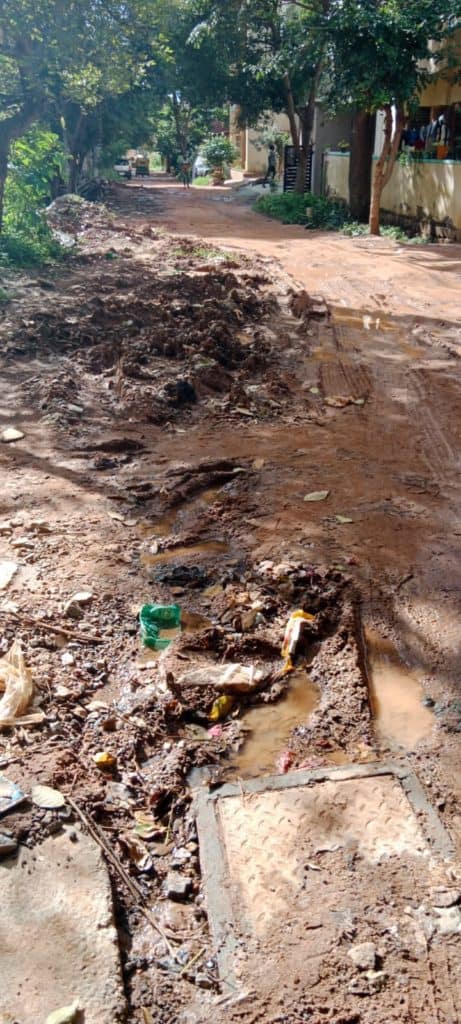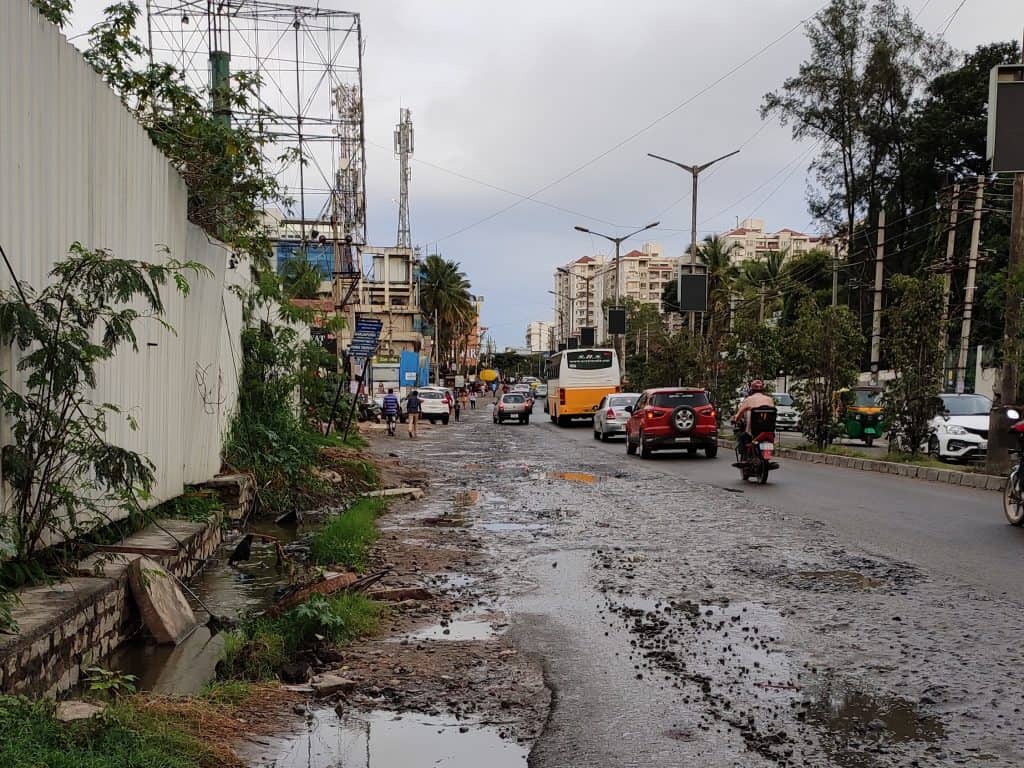The conditions of most roads in Bengaluru are as bad as they can possibly get. Potholes and slush have reduced the speed of all types of vehicles, increasing consumption of scarce fossil fuels like petrol, diesel etc., and also worsening atmospheric pollution. Citizens are losing patience.
Fed up with the deteriorating conditions of roads, citizens have been registering/highlighting their grievances on social media via creative means. Some have even taken matters into their own hands and have started fixing roads by themselves.
Yet the attitude of the executing authorities whose job it is to keep roads in good shape remains one of complacency and apathy. According to Chief Minister Basavaraj Bommai, Rs 20,000 crore have been spent on roads in the last five years.

If we look at the genesis of this man-made problem, we find that:
- Authorities are not conducting surveys of bad roads in a scientific manner
- Finalisation of road repair schemes are interrupted by recommendations/demands of Corporators, MLAs, MPs for prioritising their areas for asphalting/repairs, black/white topping etc.
- Incomplete details in tenders
- Avoidable delay in issue of work orders
- Contractors quoting low and uneconomical rates for bagging orders
- Trading or outsourcing their works to third parties for a profit
- Contractors defaulting/rescinding the contract and vanishing after drawing advances to avoid penal action
- Unseasonal and unusually heavy rains or inclement weather due to climate change
- Absence of officials during execution of works to ensure quality/quantity
- Compromises in check measurements – this is a grey area that higher-ups should look into properly
- Citizens’ negligence, inactiveness of Ward Committees/Area Sabhas/NGOs/area Welfare Associations in ensuring qualitative/quantitative execution of road works in their areas by conducting test checks with equipment available with the contractor. For example, temperature of bitumen mix, depth of laid road, compacting, camber, non-provision of proper shoulder drains with necessary slope to help rain water flow into storm water side-drains and non-clearance of clogged drains under main roads to avoid flooding, etc.
- Discontinuance of laying of plastic-coated bitumen roads
Read more: How roads are built in Bengaluru. Or not

Can these be avoided? Yes.
There is a school of thought that the system of awarding contracts for asphalting/black topping/repairs etc., is timed with the rainy season so that the roads get washed away during rains and public money has to be spent again to effect interim repairs before the time for annual repairs come again. It looks like a vicious circle. Adopting technology for cold asphalting—a method of spreading a chemical liquid into a pothole and spreading bitumen/asphalt and rolling it over—is not a remedy for this perennial problem.
All these problems and citizens complaints can be reduced if the entire process/system of calling for tenders etc. can be revised.
Following suggestions may be adopted for arresting systemic failures in planning and execution of road maintenance in accordance with the specifications prescribed under the Indian Roads Congress.
| Time frame | Activity |
| April to June | Municipal/local body budget exercise is completed. Depending upon the size of the budget, plan of action for road maintenance may be placed before the concerned committee. |
| July | Undertake physical verification of roads that need to be white-topped/ repaired/relaid/replaced with substitutes or to be just maintained as an annual exercise, and classify them into ABC category. Prescribe strict time schedules for concerned officials and elected representatives to submit their recommendations. |
| August | Complete the task of verification, finalise packages with equitable distribution of works to different classes of registered contractors on a pro-rata basis of population. Avoid splitting of contracts, to ensure transparency and accountability. |
| September | Draw up draft tender documents; float tenders, initiate and finalise the process of negotiations and number of packages. Due diligence with checks and balances must be exercised while accepting tenders from blacklisted contractors who have a clever way of bagging plum contracts with benami tenders or a coterie of contractors who bag the contracts and get work done by subcontracting the work. With e-tendering in place, the tendering process has been made easy, economical and fast. |
| September-October | Issue work orders to successful bidders and ensure that they are fully equipped with necessary machineries/implements/materials and labor. By the time this is completed, there will be enough solar light for drying up the roads for dusting, etc. |
| November/December/ January | Ensure that works are completed in strict compliance with terms and conditions of award of contract as per tendered rates. Watch out for time/cost overruns and reasons thereof, initiate immediate action either to issue notice for delay in completion of works by contractors or to rescind the contract and/or appropriate the earnest money deposits. Also, initiate penal clauses for recovery of expenditure incurred in connection with re-tendering/cost of overrun, etc. |
| February | Undertake inspection of works, conduct quality control checks, obtain actual measurements, audit, finalise bills and make payments. |
| March | Before March 31st each year, conduct a brainstorming session with officials, contractors and NGOs about the causes for non-completion of works, initiate short re-tendering, complete the works. And after due diligence, make final payments of bills to avoid surrender of budget grants due to non-utilisation. |
Read more: Plastic waste in roads: Is that the solution cities must consider?
This suggested revised schedule for undertaking qualitative/quantitative road works may solve a number of problems currently faced by authorities, lessen inconveniences to road users and avoid accidents.
If this exercise is undertaken, public money being spent ‘will not go down the drain’. Funds will be utilised for the purpose for which they were sanctioned; there will be no surrender of unutilised grants under various works.
Also, scams pertaining to year-end withdrawal of funds and depositing them in private banks in violation of financial rules and regulations, and earning audit comments thereon, may be avoided.
All repair and asphalting of roads must wait till rains start. Because, after these repairs or asphalting works get completed by the beloved contractors, rains pour down and within a short period, roads return to their original, i.e. pre repairs avatar. This helps in awarding new contracts for asphalting and repairs. Contractors Khush, Mugambos bhee khush.
There is no coordination between different agencies of the government like BWSSB, BSNL, Bascom etc. Well laid roads are dug up in no time by these organizations. Road cutting must be avoided at all costs and pipes or cables must be laid underneath the roads using modern technologies like they do in Singapore etc. Roads must be maintained at least 3 years by the contractors who win the bid. Lastly big corporates like L & T etc. must be allowed to bid for large chunk of laying roads instead of piecemeal contracts as at present
I’m also concerned about the quality of the materials used in repairing these roads(Asphalt, Tar, etc.).
I cannot believe that they would get washed away for just a few spells of rain. What about places like Singapore and Tokyo which are able to maintain their roads in excellent condition across seasons? What are they doing different from us?
I feel that sub-quality materials are deliberately preferred to ensure that the roads get damaged again, so the contractors will receive another contract next year.
And also @ Bangara – These points have been highlighted in the article. There is a nexus between policy makers, field staff, elected representatives and contractors. Most contracts are given to the kith and kin of any of these categories. It is well known that civil/road works are goldmines for those who are corrupt; they know the tricks of the trade, compromises, cooked up check measurements, compromises in using good quality and right quantity of material for road lay mix Road maintenance carried out by spending huge outlay but are not commensurate with the return for investment. We had witnessed laying of plastic roads with the twin object of getting rid of floating plastic in environment and to have durable roads in BMP – read – https://citizenmatters.in/road-construction-plastic-waste-management-environment-pollution-8804 – If I remember I witnessed laying of plastic coated bitumen tar mix road on Millers
Road which I used to traverse daily. It lasted in good stead for quite a long time. Laying plastic roads must be given priority over conventional road mix. Indian Road congress rules may be adhered to strictly. In addition, I blame the citizens also for not taking active interest while their streets are being repaired/laid with tar mix, they must check for the right temperature of the mix, thickness of layer, etc., with instruments available with the contractor, demand relaying or call the corporator/ engineer to hear their complaint/supervise properly, disapprove night time laying/repair works, etc. instead of crying hoarse later.
During rains, all potholes are filled with water and becomes invisible,it is highly risky for the two wheelers getting struck and break thier limbs. BBMP officials so called engineers are least bothered to visit the area even when they are called for. They simply assign the work to contractors who does a shabby incomplete work and walk away after getting their payments. Elected representatives also behave in the same manner, least bothered about the citizens who have elected them